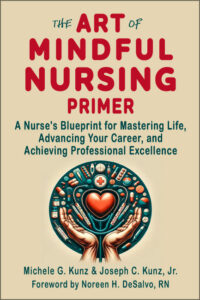Subtitle
How to Achieve Personal, Professional, and Financial Success in Your Nursing Career
Synopsis
Drawing on 45 years of patient care experience, teaching, and mentoring, the author shares invaluable insights for young nurses to thrive in their careers. This article outlines what true success looks like for nurses and provides practical advice to achieve personal, professional, and financial fulfillment. She discusses ten key strategies to help young nurses build a rewarding, sustainable, and prosperous career. From defining success and committing to lifelong learning to embracing leadership and managing finances wisely, this comprehensive guide offers the essential steps for a successful nursing journey.

Introduction
a. More Than Just a Job
As a nurse, your career is more than just a job—it’s a calling that can shape your life in extraordinary ways. When I first stepped into the world of nursing over 45 years ago, I could not have imagined the depth and breadth of experiences that would shape my professional and personal life.
Nursing has given me the privilege of touching countless lives, the opportunity to teach and mentor the next generation of nurses, and the ability to find a deep sense of purpose and fulfillment. Through the years, I’ve seen the incredible potential that nursing offers to those willing to commit themselves fully to this noble profession.
b. The Path to Success
Yet, success in nursing doesn’t come automatically. It requires dedication, self-reflection, continuous learning, and strategic planning. Throughout my career, I’ve seen many young nurses, full of passion and energy, struggle to find their way.
The key to thriving in this demanding yet rewarding field lies in understanding what true success means—professionally, personally, and financially. My experience has shown me that a well-rounded approach to success in nursing involves balancing these three aspects to achieve a fulfilling and sustainable career.
c. A Roadmap for Young Nurses
In this article, I want to share with you the blueprint that has guided my journey and that of many successful nurses I’ve mentored. Whether you’re a new graduate just starting on your path or an experienced nurse looking for renewed direction, these principles will help you navigate the complexities of a nursing career and find the success you seek.
From defining your version of success and embracing lifelong learning to cultivating strong communication skills and managing your finances wisely, these ten strategies are designed to help you build a nursing career that is not only successful but also meaningful and joyful.
A. Define What Success Means to You
1. Personal Definition of Success
Success in nursing isn’t one-size-fits-all. For some, it’s about rising to leadership roles; for others, it’s about becoming the best bedside nurse they can be. Start by defining what success means to you personally. Is it job satisfaction, work-life balance, or professional recognition? Knowing what you value most will guide your decisions and career trajectory.
2. Setting Achievable Goals
Take some time to write down your short-term and long-term goals. Make sure these goals are realistic and achievable yet challenging enough to motivate you. For example, if you’re passionate about a particular specialty, set a goal to become certified in that area. If leadership appeals to you, identify steps to move into a managerial or supervisory role. Regularly revisiting and refining these goals will help keep you focused and on track.
3. Adapting Your Definition of Success
Success is not static; it evolves as you grow. It’s essential to reassess your definition of success periodically. What matters most to you at the beginning of your career may change over time. Embrace these changes, and don’t be afraid to pivot. Flexibility and adaptability are critical components of a successful career.
B. Commit to Lifelong Learning
1. The Importance of Staying Updated
Nursing is an ever-evolving field. Staying updated with the latest practices, technologies, and research is essential. Enroll in continuing education courses, pursue certifications, and consider advancing your degree. Not only does this enhance your competence, but it also opens doors to new opportunities and higher pay. Make a habit of reading nursing journals, attending workshops, and participating in professional organizations.
2. Benefits of Expanding Knowledge
Continuing education keeps your skills sharp and expands your knowledge base, making you a more versatile nurse. For instance, learning about emerging healthcare technologies can prepare you for future advancements that may soon become standard practice. Being proactive about your education can position you as a leader in your field, setting you apart from your peers.
3. Embracing Informal Learning Opportunities
Don’t underestimate the value of informal learning opportunities, such as online courses, webinars, and podcasts. These can be a convenient way to stay informed about the latest developments in healthcare without a significant time commitment. Also, consider cross-training in different specialties or departments to broaden your understanding and experience.
C. Develop Strong Communication Skills
1. The Role of Communication in Nursing
Effective communication is the cornerstone of successful nursing. It involves not just speaking but also listening actively and empathetically. Clear and compassionate communication builds trust and improves patient outcomes, whether it’s communicating with patients, families, or other healthcare professionals. It also makes you a valuable team member and can lead to leadership opportunities.
2. Enhancing Verbal and Non-Verbal Skills
Take the time to develop your verbal and non-verbal communication skills. Being able to convey complex medical information in a way that patients and families can understand is crucial. This skill reduces anxiety, fosters cooperation, and improves adherence to treatment plans. Remember, communication is not just about words; your body language, facial expressions, and tone of voice also speak volumes.
3. Communication for Team Collaboration
In addition to patient interactions, communication is vital for collaboration within healthcare teams. Effective communication ensures that everyone is on the same page regarding patient care, which reduces errors and improves efficiency. Make it a habit to provide colleagues with clear, concise, and timely updates. If conflicts arise, address them professionally and constructively to maintain a positive working environment.
D. Practice Mindfulness and Self-Care
1. Preventing Burnout Through Mindfulness
Nursing is rewarding but can be physically and emotionally draining. Practicing mindfulness and self-care is crucial to prevent burnout and maintain personal well-being. Reflect on your experiences, set boundaries, and ensure you look after your mental and physical health. A well-cared-for nurse is better equipped to care for others.
2. Incorporating Mindfulness into Daily Routine
Mindfulness can be incorporated into your daily routine through simple practices like deep breathing exercises, meditation, or even a short walk during your break. These practices help you stay present, reduce stress, and improve emotional regulation. When you’re mindful, you’re more aware of your feelings and reactions, which can help you handle challenging situations with greater composure.
3. Balancing Self-Care and Professional Life
Self-care goes beyond physical health—it also involves nurturing your emotional and mental well-being. Engage in activities you enjoy outside of work, whether a hobby, exercise, or spending time with loved ones. Creating a healthy work-life balance is essential. Don’t hesitate to seek professional help if you’re feeling overwhelmed; there’s no shame in prioritizing your health.
E. Cultivate a Professional Network
1. The Power of Networking in Nursing
Building a solid professional network can significantly impact your career growth. Connect with colleagues, join nursing associations, attend conferences, and seek mentors. A robust network can provide support, open doors to new opportunities, and offer invaluable advice and insights. Remember, your network is not just about what others can do for you but also about how you can contribute to the nursing community.
2. Starting Within Your Workplace
Start by forming connections within your workplace. Get to know nurses in other departments, as well as doctors, administrators, and other healthcare professionals. Each of these connections can offer different perspectives and support. Professional relationships can also lead to collaborative projects, research opportunities, and job offers.
3. Expanding Your Network Beyond Work
Consider joining national and local nursing organizations outside your immediate workplace. These groups often provide resources like webinars, job boards, and newsletters that keep you informed and connected. Attending conferences and seminars can also be a great way to network and learn from experts in your field. Don’t forget the power of online networking through platforms like LinkedIn.
F. Embrace Leadership Opportunities
1. Leadership Beyond Titles
Leadership is not just about holding a title. It’s about being proactive, setting examples, and taking initiative. Whether you’re leading a team or a project, demonstrating leadership qualities will set you apart and position you for advancement. Leadership also enhances your problem-solving and decision-making skills, which are critical in nursing.
2. Finding Everyday Leadership Roles
Look for leadership opportunities in everyday tasks. It could be mentoring a new nurse, leading a patient education session, or organizing a community health event. These small acts of leadership build your confidence and demonstrate your capabilities to supervisors. Leadership skills are highly valued, even if you’re not in a formal leadership position.
3. Formal Leadership Training
Consider formal training or courses in leadership and management. These programs can equip you with the skills to handle complex administrative tasks, manage teams, and make strategic decisions. Developing a leadership mindset will prepare you for future roles such as charge nurse, nurse manager, or director of nursing.
G. Focus on Patient-Centered Care
1. The Essence of Nursing
Success in nursing always comes back to the patient. Providing compassionate, patient-centered care should be at the heart of everything you do. You build trust and make a lasting impact when you consistently advocate for and prioritize your patients’ needs. This dedication enhances your professional reputation and brings immense personal satisfaction.
2. Seeing Patients as Whole Individuals
Patient-centered care involves seeing the patient as a whole person, not just a set of symptoms. It means taking the time to listen to their concerns, respecting their preferences, and involving them in decisions about their care. By doing so, you empower patients and improve their health outcomes. This approach leads to higher patient satisfaction, which can positively affect your hospital’s ratings and your professional reputation.
3. Commitment to Quality Care
Incorporate evidence-based practices to deliver the best possible care. Stay informed about new research and guidelines that can improve patient outcomes. Make it a habit to evaluate your practice and seek feedback from patients and colleagues. This commitment to continuous improvement shows that you value quality care and are dedicated to the well-being of your patients.
H. Manage Your Finances Wisely
1. The Role of Financial Well-Being
A successful nursing career includes financial well-being. Understand your worth and negotiate your salary. Invest in retirement plans, save for emergencies, and budget wisely. Consider additional income streams such as teaching, consulting, or writing if they align with your interests and expertise. Financial stability reduces stress and allows you to focus on what you love about nursing.
2. Financial Planning and Management
Educate yourself about financial planning and management. This might involve meeting with a financial advisor to discuss retirement planning, investments, and saving strategies. Knowing how to manage your finances effectively will give you peace of mind and flexibility in your career choices. Financial literacy is an essential skill for personal success.
3. Exploring Additional Income Opportunities
Explore opportunities for additional certifications or advanced degrees that can increase your earning potential. Consider taking on part-time work or freelance opportunities related to nursing. This can include writing health-related articles, teaching certification courses, or consulting in your area of expertise. These additional income streams can enhance your financial security and provide more career options.
I. Seek Feedback and Reflect Regularly
1. The Importance of Feedback
Regular feedback and self-reflection are vital for growth. Seek feedback from peers, supervisors, and patients to understand your strengths and areas for improvement. Reflection helps you learn from your experiences and adapt to new challenges. Make it a habit to set goals, evaluate your progress, and adjust your strategies as needed.
2. Constructive Use of Feedback
Feedback can come from formal performance reviews, patient satisfaction surveys, or informal conversations with colleagues. Use this feedback constructively. Instead of feeling defensive, view it as an opportunity to learn and grow. Positive feedback boosts your confidence, while constructive criticism helps you improve your practice.
3. The Power of Reflection
Reflection is equally essential. Take time at the end of each day to think about what went well and what could have been better. Journaling can be a powerful tool for reflection, helping you track your progress over time and recognize patterns in your practice. Regular reflection ensures that you’re not just going through the motions but actively engaged in your personal and professional development.
J. Stay Passionate and Find Your Joy
1. Remembering Your ‘Why’
You must remind yourself why you chose nursing in the first place. Reconnect with the passion that brought you into this profession. Whether through patient interactions, mentoring, or special projects, find the aspects of nursing that bring you joy and focus on them. A passionate nurse is more effective and inspires others around them.
2. Reigniting Your Passion
Keeping your passion alive might mean seeking new challenges or exploring different specialties within nursing. If you feel your enthusiasm waning, take a step back and consider what changes you can make to reignite your passion. This could involve undertaking a new project, furthering your education, or changing your work environment.
3. Finding Joy in Daily Interactions
Remember that joy in nursing comes from making a difference in the lives of others. Every patient interaction is an opportunity to make a positive impact. Celebrate your successes, no matter how small they may seem, and recognize your unique role in the healthcare team. A career in nursing is a journey filled with challenges and triumphs, and finding joy in the day-to-day can make all the difference.
Conclusion
a. A Journey of Learning and Compassion
A nursing career is a journey filled with learning, compassion, and growth. You can create a fulfilling and sustainable career by focusing on personal, professional, and financial success. Remember, success isn’t just about reaching a destination; it’s about finding joy and meaning in your work every day. Your path may not always be easy, but with dedication, resilience, and the right strategies, you can build a nursing career that’s as rewarding as it is impactful.
b. Making a Lasting Impact
The lessons I’ve learned over my 45-year career have shaped who I am as a nurse, a mentor, and a person. Nursing has given me the tools to make a difference in the lives of my patients, and it has provided me with opportunities to grow personally and professionally. I encourage you to embrace these principles and make them your own. Success in nursing is not just about what you achieve for yourself but also about the positive impact you have on others.
c. Embrace Your Role as a Nurse
As you navigate your nursing career, keep in mind that you are part of a profession that has the power to change lives. Each day, you have the chance to make a difference, to be a source of comfort, and to bring healing. By striving for personal, professional, and financial success, you are not only building a better future for yourself but also contributing to the betterment of healthcare and the lives of those you serve. Embrace this journey with passion, commitment, and the knowledge that the work you do as a nurse truly matters.
Ready to Bring Mindfulness into Your Nursing Practice?
 If you’re looking to deepen your understanding of mindfulness and discover practical ways to incorporate it into your daily routine, The Art of Mindful Nursing Primer is the perfect resource.
If you’re looking to deepen your understanding of mindfulness and discover practical ways to incorporate it into your daily routine, The Art of Mindful Nursing Primer is the perfect resource.
This book offers insightful strategies, real-world applications, and easy-to-follow techniques designed specifically for nurses. Empower yourself, reduce stress, and enhance the care you provide—one mindful moment at a time.
Check out The Art of Mindful Nursing Primer today!
Success in nursing isn’t just about the number of patients you care for; it’s about the compassion you show, the wisdom you share, and the joy you find in making a difference each and every day. — MK


